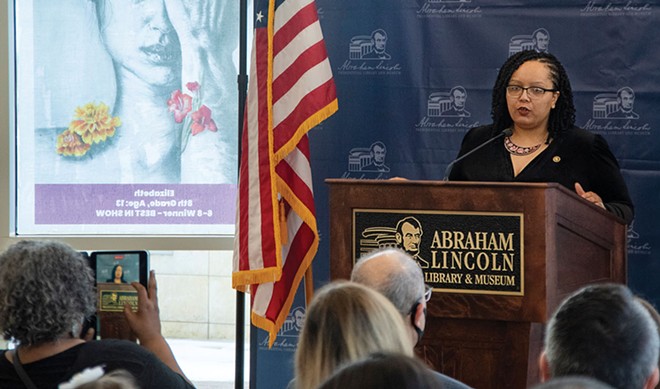
Juneteenth, or Freedom Day, is the nationally celebrated commemoration of the ending of slavery in the United States. On June 19, 1865, Union Army General Gordon Granger announced the freedom of more than 250,000 enslaved Black people in Galveston, Texas. This was one of the last groups of people to be freed from institutional slavery in the United States.
Illinois made Juneteenth an official state holiday in 2021 when Governor JB Pritzker signed a bill to recognize the anniversary of June 19, 1865. This legislation was signed into law in Springfield at the Abraham Lincoln Presidential Library and Museum (ALPLM). Christina Shutt, a historian and director of the ALPLM, provided some insights about the history of Juneteenth as it relates to the ALPLM, as well as the larger Springfield community.
While Juneteenth has its origins in Galveston, Texas, various emancipation celebrations have been held in Illinois and elsewhere throughout the latter half of the 19th century. Some African Americans began to celebrate the commemoration of the date that Britain outlawed slavery in its colonies via the Slavery Abolition Act of 1833. Following the Civil War, African American communities began recognizing and celebrating the signing of both the Emancipation Proclamation on Jan. 1, 1863, and the Preliminary Emancipation Proclamation, which was issued 100 days earlier, on Sept. 22, 1862.
According to Shutt, in 1906 Springfield's African American weekly paper, The Forum, began publishing invitations for the community to attend emancipation celebrations featuring games, performances and picnics, as well as a reading of the Emancipation Proclamation.
Over time, interest in Juneteenth locally and nationally struggled due to fear of violence and racial terror, and there were very few places for Blacks to celebrate, as many cities had barred them from being in public spaces.
Shutt said that following the assassination of Martin Luther King Jr. in 1968, there was a resurgence of looking back to the days of Abraham Lincoln and the Emancipation Proclamation to celebrate how far the African American community had come, as well as an interest in wanting to celebrate and acknowledge the struggles of Black people in the United States. This led to more modern Juneteenth celebrations appearing throughout the 1960s and 1970s, all with roots in honoring the emancipation commemorations that had been marked in previous years.
This weekend, Juneteenth Inc. will host Springfield's four-day Juneteenth celebration, and the Abraham Lincoln Presidential Library and Museum will also commemorate the holiday. The ALPLM plans to put the Emancipation Proclamation on display to the public from June 17-30. The Proclamation will be on display in the library, with no admission charge, fulfilling one of the missions of Shutt and the ALPLM to return historical documents to the people. The library is open 9 a.m.-4:30 p.m., Monday through Friday. The ALPLM will be open during the Juneteenth holiday.
In addition, Shutt said she is excited to speak at the Juneteenth Inc. rally, and she and the staff of the ALPLM will have historical and educational resources available to anyone in the community seeking to know more about Springfield's involvement in this important holiday.
Pamela Savage is a freelance writer living in Springfield.

